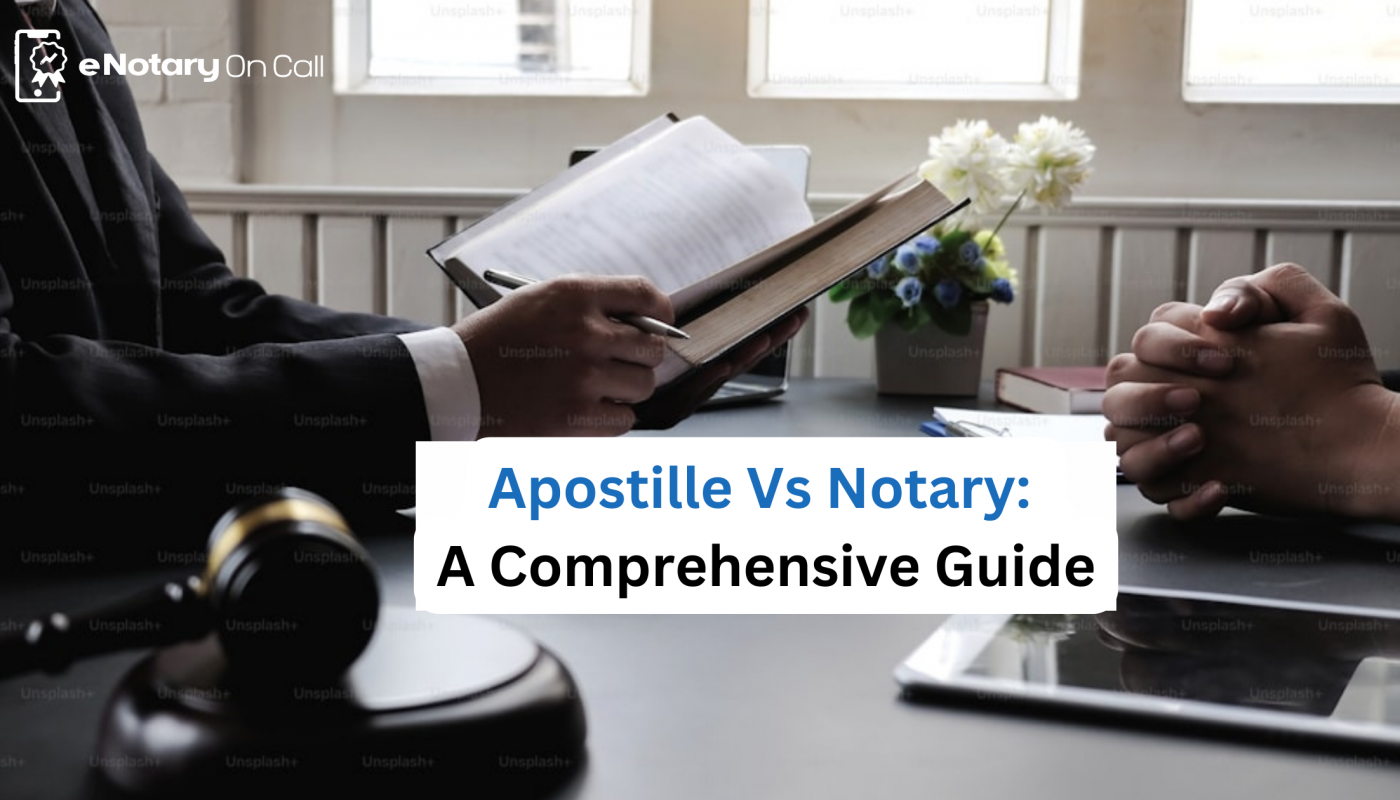

Two terms often create confusion in document authentication: Apostille and Notary. These labels play distinct roles in validating documents, both domestically and internationally.
For instance, a notary’s seal on a power of attorney ensures its validity within a state. At the same time, an Apostille on a birth certificate facilitates its acceptance in countries part of the Hague Apostille Convention.
This comprehensive guide aims to clarify Apostille vs. Notary, their unique purposes, and when to use them.
Apostille is essential for papers meant to be used in nations that have signed the Apostille Convention. It includes birth certificates, corporate documents, academic transcripts, and other official records.
To obtain an Apostille, the issuing authority of the document (such as a state’s Secretary of State) certifies that the document is genuine. The Apostille is then attached to the document, typically as a separate page or stamp, confirming its authenticity for international use.
Is Apostille required for all international documents? No, only documents intended for use in Apostille Convention member countries require Apostille certification.
Can any authority issue an Apostille? No, only designated authorities, such as state Secretaries of State, are authorized to issue Apostilles.
How long does it take to get an Apostille? Processing times vary depending on which authority is issuing the Apostille and what kind of document it is.
The primary purpose of notarization is to prevent fraud and provide a layer of trust and credibility to documents. Notarized records are oftentimes demanded for legal transactions, real estate transactions, financial agreements, construction, and other significant agreements.
When a document needs notarization, the individual must appear before a notary public and present valid identification. The notary verifies the person’s identity and witnesses the document’s signing. They then affix their official seal or stamp along with a signature. This process validates that the document is genuine and legally binding.
Want to know if the notary public is the same as the Apostille? Let us see how both are distinct entities with different functions and purposes:
Apostille: An Apostille is a specialized certificate used to authenticate public documents for international use. It verifies the document’s origin and validity.
Notary Public: A Notary Public verifies signatures, identities, and the authenticity of documents within a specific jurisdiction.
Apostille: The Apostille is recognized by countries that are part of the Hague Apostille Convention, simplifying the document legalisation process for international use. It is crucial for foreign court and government recognition, certifying signatures, and document authenticity internationally.
Notary Public: Notarized documents are primarily recognized and accepted within the jurisdiction where the Notary Public is authorized to operate within their state.
Apostille: The Apostille, issued by a designated authority in the country of origin, certifies the document’s authenticity and legal validity for use abroad.
Notary Public: A Notary Public verifies signatures, witnesses document signings, and affixes an official seal or stamp to validate the document.
Apostille: Apostille certification applies to public documents such as marriage certificates, academic transcripts, and legal agreements.
Notary Public: Notary services are commonly required for legal documents, contracts, affidavits, powers of attorney, and real estate transactions.
Apostille: It differs depending on the issuing authority and the document type. It typically involves a fee and may take several days to process. In the US, an Apostille might cost between $20 and $200.
Notary Public: Notary services usually involve a fee per document, and the process is relatively quick, often completed during a single appointment. Documents can be notarized remotely for $25 using the eNotary On Call Remote Online Notary platform.
The decision between the Apostille and the notary depends on the nature of the document and its intended use. If the document requires validation for international use in an Apostille Convention member country, Apostille is the appropriate choice. On the other hand, for domestic legal matters and general document authentication, notarization suffices.
It’s clear that both Apostille and notary services serve indispensable roles in granting legal validity and international recognition. While notaries authenticate documents within a specific jurisdiction, Apostille certification streamlines the process for cross-border acceptance, particularly in countries part of the Hague Apostille Convention.
Whether you need documents authenticated for global transactions or local legal matters, choosing the right authentication and having a reliable partner like eNotary On Call can make all the difference.
eNotary On Call offers the best Remote Online notarization (RON) services tailored for urgent and important documents. Whether you need notary services for domestic documents or Apostille certification for international recognition, eNotary On Call provides a reliable and trusted solution.
With eNotary On Call, you can enjoy:
1. Remote Online Notarization: Conveniently get your documents notarized with live notaries from anywhere in just 15 minutes.
2. Apostille Services: Get your international documents Apostille-certified quickly and affordably.
3. Legal Compliance: You can be sure that your documents abide by all applicable laws and authentication specifications. Our platform is NNA and MISMO certified.
4. Professional Certified Notaries: Get the assistance of experienced, certified notaries who are dedicated to providing outstanding service each and every time. Choose eNotary On Call for fast, secure, and hassle-free notary and Apostille services. Experience the convenience of Remote Online Notary and ensure your documents are recognized and trusted globally.